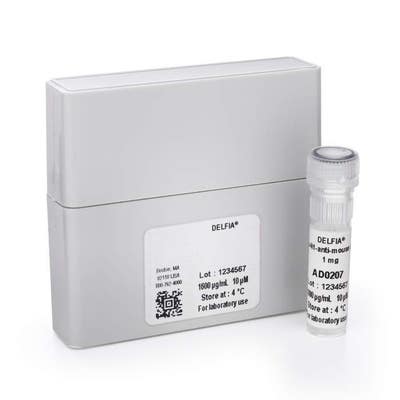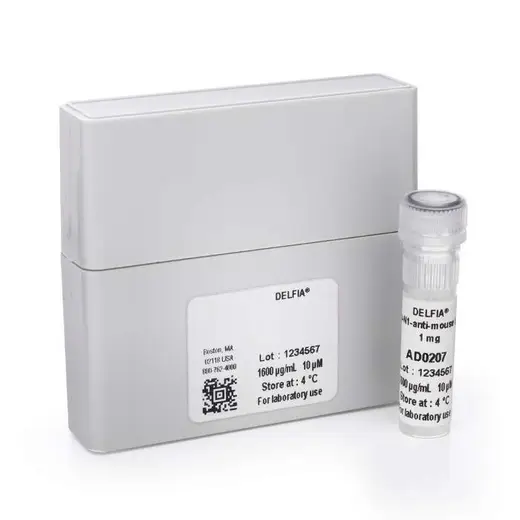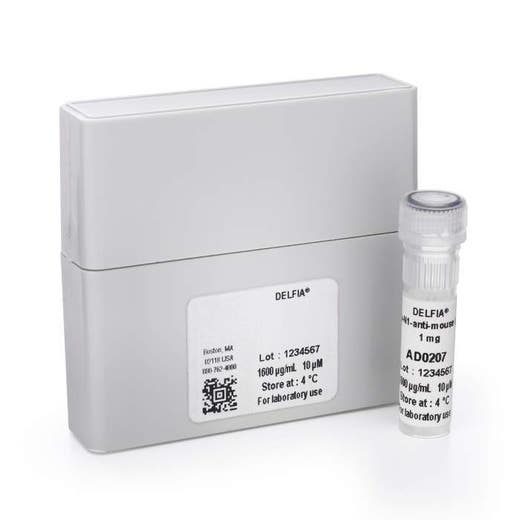
DELFIA Eu-N1 Anti-Human c-Myc Antibody, 1mg

DELFIA Eu-N1 Anti-Human c-Myc Antibody, 1mg




Europium-labeled anti-c-myc antibody, for capturing c-myc-tagged proteins in DELFIA® TRF assays.
For research use only. Not for use in diagnostic procedures. All products to be used in accordance with applicable laws and regulations including without limitation, consumption and disposal requirements under European REACH regulations (EC 1907/2006).
| Feature | Specification |
|---|---|
| Application | Protein-Protein Interaction |
Europium-labeled anti-c-myc antibody, for capturing c-myc-tagged proteins in DELFIA® TRF assays.
For research use only. Not for use in diagnostic procedures. All products to be used in accordance with applicable laws and regulations including without limitation, consumption and disposal requirements under European REACH regulations (EC 1907/2006).


DELFIA Eu-N1 Anti-Human c-Myc Antibody, 1mg


DELFIA Eu-N1 Anti-Human c-Myc Antibody, 1mg


Product information
Overview
DELFIA® Eu-labeled anti-c-myc antibodies are purified mouse IgG1 monoclonal antibodies, which recognize the epitope sequence (EQKLISEEDL) derived from the human c-myc protein. These monoclonal antibodies against the c-myc epitope do not cross react with other cellular proteins.
Generic DELFIA® reagents are intended for use in dissociation-enhanced time-resolved fluorometric assays. All reagents have been labeled using the DELFIA® N1-chelate. They are suitable for highly sensitive end point measurements in separation based assays such as those for detection of protein-protein binding and cell adhesion as well as for immunoassays.
DELFIA® (dissociation-enhanced lanthanide fluorescence immunoassay) is a time-resolved fluorescence (TRF) intensity technology. Assays are designed to detect the presence of a compound or biomolecule using lanthanide chelate labeled reagents, separating unbound reagent using wash steps. DELFIA assays are flexible, compatible with a variety of plate readers, and, as this is a wash-based technology, compatible with most sample types. The technology is based on fluorescence of lanthanide chelates (Europium, Samarium, and Terbium). The fluorescence decay time of these lanthanide chelate labels is much longer than traditional fluorophores, allowing efficient use of temporal resolution for reduction of autofluorescent background. The large Stokes’ shift (difference between excitation and emission wavelengths) and the narrow emission peaks contribute to increasing signal-to-noise ratio. Sensitivity is further increased because of the dissociation-enhancement principle: the lanthanide chelate is dissociated and a new highly fluorescent chelate is formed into a protective micellar solution. DELFIA lanthanide chelates require this dissociation/enhancement step for fluorescence (induced by addition of DELFIA Enhancement solution, DELFIA Inducer, and DELFIA Enhancer as appropriate to the particular lanthanide chelate).
Specifications
| Application |
Protein-Protein Interaction
|
|---|---|
| Automation Compatible |
Yes
|
| Brand |
DELFIA
|
| Conjugates |
Anti-c-Myc
|
| Detection Modality |
DELFIA
|
| Fluorophore |
Eu-N1
|
| Product Group |
Antibody
|
| Shipping Conditions |
Shipped in Dry Ice
|
| Target Class |
Binding Assay
|
| Technology |
TRF
|
| Unit Size |
1 mg
|
Resources
Are you looking for resources, click on the resource type to explore further.
DELFIA immunoassays are a superior alternative to traditional ELISAs
This guide provides an introduction to the DELFIA method, and to the labeling procedures involved.


How can we help you?
We are here to answer your questions.






























